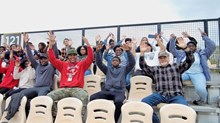On Racial Justice: The Question Is, Do We Want to Get Well?

“But, what should I do?” might be the most common question I hear in circles with White people concerned about racial injustice. For many White folks, they are earnestly seeking wisdom and practical steps to engage. The trouble is, I think they’re asking not just an incomplete question (what should you do about what exactly? The school-to-prison pipeline? The fact that Black women are three to four times more likely to die in labor than White women? Racial profiling and environmental racism? The list could go on and on)—they’re asking the wrong question altogether.
I get it. For a really long time, I thought taking immediate action was not just an important step, but THE step in addressing issues of racism and discrimination.
For the first 21 years of my life, the beginning and the end of my thoughts and actions regarding race was: What should I do to let people know I’m not a racist? Someone they don’t have to worry about. Because we all know being racist is really bad. And super-mean. So to not be a racist probably means to be nice. Smiling is nice. I’ll do that. It’s such a bummer that African Americans are incarcerated at five times the rate of White people. I’ve decided the best course against this action is to smile. Have a great day!
Oof. If we want better action, we probably need to start asking better questions.
I have always loved the interaction recorded in John 5 between Jesus and the man lying beside the pool. Unable to walk for 38 years, the man had been coming to this healing water every day for years, hoping for a miracle. As Jesus encountered the man, Jesus could have asked him lots and lots of questions about his ailment, or offered sympathy or even a lovely blessing, but he didn't. Instead, Jesus asked him one single question: “Do you want to get well?” (John 5:6, NIV) The man doesn’t answer Jesus’ question directly and instead comes up with what I interpret as a complaint for why he hasn’t gotten well already. But he doesn’t deny that he isn’t well. Jesus heals him instantly.
So let me ask you: Do you want to get well?
Our answer should be obvious, right? Only it’s not. Getting well is not always an easy or simple process. First, you have to admit to yourself and to those around you that you are not well, or that something is broken or not working or sick. This is no small thing. Facing a diagnosis with no clear cure is daunting. Often intimidating and overwhelming.
I used to run from the reality that I was not well, that I was sick with racism (both individually and through racist systems and institutions that I actively participated in), and from the truth that, if left untreated, the diagnosis would go unchanged. And yet, even when faced with the potential that this was indeed the diagnosis, I was in denial.
I tried to appear well, to fake it through smiles and niceness. But these actions were only a Band-Aid when I was in need of much deeper healing.
I love how writer Toni Cade Bambara puts it in her book The Salt Eaters: “Are you sure sweetheart, that you want to be well? ... Just so’s you’re sure, sweetheart, and ready to be healed, cause wholeness is no trifling matter. A lot of weight when you’re well.”
She’s right. We sometimes act like getting well should take no effort or time—or not be hard at all. But it can be a lot to handle, to process not only what we were/are sick with, but also how we attempt to heal.
It takes practice.
“The best criticism of the bad is the practice of the better,” writes Franciscan priest and author Richard Rohr in his book Things Hidden: Scripture as Spirituality. The invitation to racial justice work wasn’t about faking anything, it was actually about naming the symptoms and getting a true diagnosis. It was the practice of the better, of vulnerability, of discomfort, of belief, of presence.
We are sick. And we can get better. It will take some real practice and some real healing. We just have to want to get well.
Jenny Booth Potter is a creative producer, storyteller, and co-host of The Next Question, a web series about expanding our imagination for racial justice. She has co-led racial justice training across the country for churches and organizations, and is a founding partner of HerSelf Media, an organization that aims to create stories that empower and bring joy to Black women. She is the author of Doing Nothing is No Longer an Option. Visit her website at jennyboothpotter.com. Follow her on Twitter: @JennyBPotter.
The Better Samaritan is a part of CT's
Blog Forum. Support the work of CT.
Subscribe and get one year free.
The views of the blogger do not necessarily reflect those of Christianity Today.






















